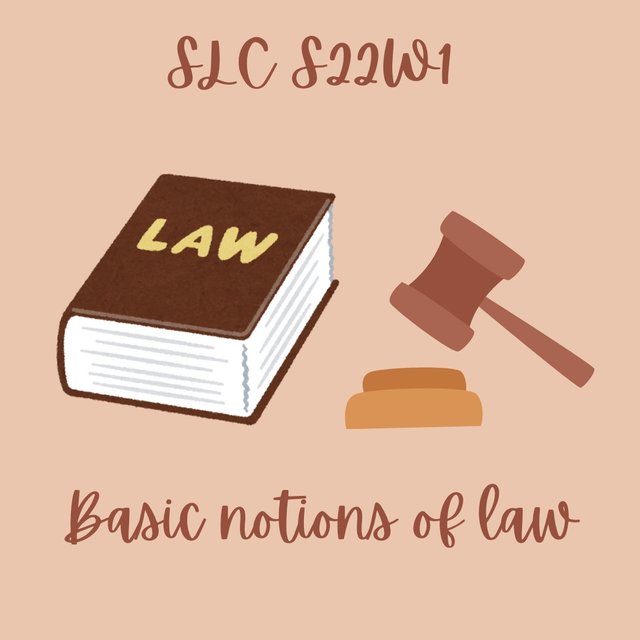
If I talk about law definition which I have learned from this course then this is basically combination of some particular rules and regulations which are important for governing behaviour of human and interactions of human in society which give surety of social orders, protection of rights of every citizen and promotion and enhancing of goodness generally in society.
Objective law and examples (According to Pakistan):
If I define objective law according to my country Pakistan then these are defined as loss which are written and these are codified and are applicable at international level. Now let's have a look at two examples of objective law according to Pakistan;
- If I talk about Pakistan penal code then this law was made in 1860 and is useful for highlighting particular punishments or penalties for multiple crimes that are implemented at each criminal equally.
- If I talk about Motor vehicles ordinance then this was the law made in 1965 and made for regulation of traffic rules licensing and registration of different vehicles and this law is implemented to every driver and owner of vehicle equally.
Subjective law and examples (According to Pakistan):
If I talk about subjective law according to Pakistan then it is defined as laws or social norms which are not written and are not applicable internationally because they depend on culture ,moral and ethical standards of each country. Now let's have look at examples of subjective laws according to Pakistan;
- If I talk about giving respect to elders then this is subjective law which is not qualified but this is a social norm you can say which is ingrained in culture of Pakistan a lot.
- If I talk about standards of community for dressing then this is unwritten rule but still it is used for governing dress code and behaviour in public place in different regions.
Depending on scenario these are extracted objective and subjective laws according to my understanding;
Objective Law
If I talk about traffic laws in which citizen seems to disregard traffic light then it's a clear violation of traffic law which is objective law because it's written and almost considerable internationally and implemented equally to each person.
If I talk about consequences of violation of traffic rules or laws then definitely traffic police officer have authority for stopping citizen and issuing him fine or punishment according to his traffic law violation and this is also objective law because it is all predetermined consequence if someone is breaking rule.
Subjective Law
If I talk about citizen justification, where citizen is claiming that because of his personal problem that he was in hurry and he have to take his son to hospital then this is subjective justification and its an example of subjective law because there is present of personal and ethical judgement of person who is suffering as well as it can't be applicable internationally.
If I talk about officer discretion in this scenario in which police officer is deciding that either he should give warning to this person or he should issue fine after understanding justification of citizen is also an example of subjective law because here is involvement of personal call of judgement by police officer and it is also not applicable at each citizen.
If I talk about my understanding about low and normal then I can explain it according to my country Pakistan by different exemplifications!
Law
If I talk about law then these are written, codified rules which are enforced by authority which is governing or responsible for governing that rule. Laws can be universal, objective and they are also implemented to every citizen equally.
Example
• If I talk about Pakistan penal code which was made in 1860, then when we have a look at 3:22 section of this code then it says that;
"Whatever the person is if he is causing hurt intentionally, then he should be punished with imprisonment for a properly describe the term that can be extended for more than one year also as well as second option can be giving punishment of fine to that person in which person have to pay fine of 1000 PKR and in another case both punishments can be implemented at same person according to his act"
In my country Pakistan, this is a written rule which can be governed by state and it is implemented equally to citizen thats why this is a law not a norm.
Norm
If I talk about norm then these are social expectations and rules that are not written directly but these are important for governing behaviour of human. Norms can be subjective can be modified and can be variable from country to country or from culture to culture.
Example
If I talk about respecting elders in Pakistan then this is a norm in almost every reason of Pakistan by usage of honorific titles given to elders, by offering seats to elders if you are travelling so that you may receive blessings from them. It's an example of norm because it's not written properly but it's a social rule that is followed in Pakistan society by every culture.
Depending upon the scenario according to course here is my analysis!
Violation of a Law
If I talk about Mr. Juan Perez then he is violating a law by not giving payment of his rent for 3 months.It's a contractual obligation, and failure for paying rent is a breach for rental agreement.So if I say that it's a consise and clear example of violation of law, most particularly laws that govern rental agreements and contractual obligations.
Violation of a Norm
If I talk about Mr. Juan Perez where he is violating a norm then he kept 4 dogs as pets in his apartment ignoring that it's not allowed in the building's rules of coexistence.It's unwritten social rule which was expected to be followed by people living in building.As Mr. Juan Perez kept 4 dogs so he have violated and don't take care of this social norm which have caused disturbances for his neighbors.
If I say that he have violated a law by not giving payment of his rent and violated a norm by keeping pets in apartment when it was prohibited to keep pets there then it's true!
Before explaining importance of comparative law for me according to my understanding from course first I would like to explain that what comparative law is;
If I talk about comparative law then this is basically presence of differences and similarities in between laws of different countries and legal systems so it includes to analyse and compare rules ,laws, regulations and legal institutions for different jurisdictions for identification of differences, commonalities and best practices presence.
If I talk about comparative law importance according to me then it can be understood by the following points I am explaining along reasons;
• For me comparative law is really important for exploring and understanding legal systems of different countries ,cultures and traditions because it helps to gain appreciation for diversity of human experience and to understand that how much world is complex legally.
• For me comparative law is really important for having a no how of solutions and new approaches for legal problems that are present generally at international level so by knowing strength and weakness of legal systems globally it's an help me to know that which laws are most effective and which are not.
• For me comparative law is important for enhancement of critical thinking because when I will evaluate and analyse similarities and differences in different legal systems of different countries and cultures then it will help me for enhancing my comparison making ,contrasting and complex information evaluation skills.
• For me comparative law is important for informing reforms and policy development of different laws by having a know how different countries legal system experiences lawmakers and policy makers can also make more effective laws according to requirements of citizens.
Practical Applications
If I talk about some practical applications of comparative law then these are important for international businesses, for knowing rights of human at global level and for having a day understanding of environment law!
I want to invite @alejos7ven,@rmm31,@lhorgic to participate


Upvoted! Thank you for supporting witness @jswit.
Downvoting a post can decrease pending rewards and make it less visible. Common reasons:
Submit